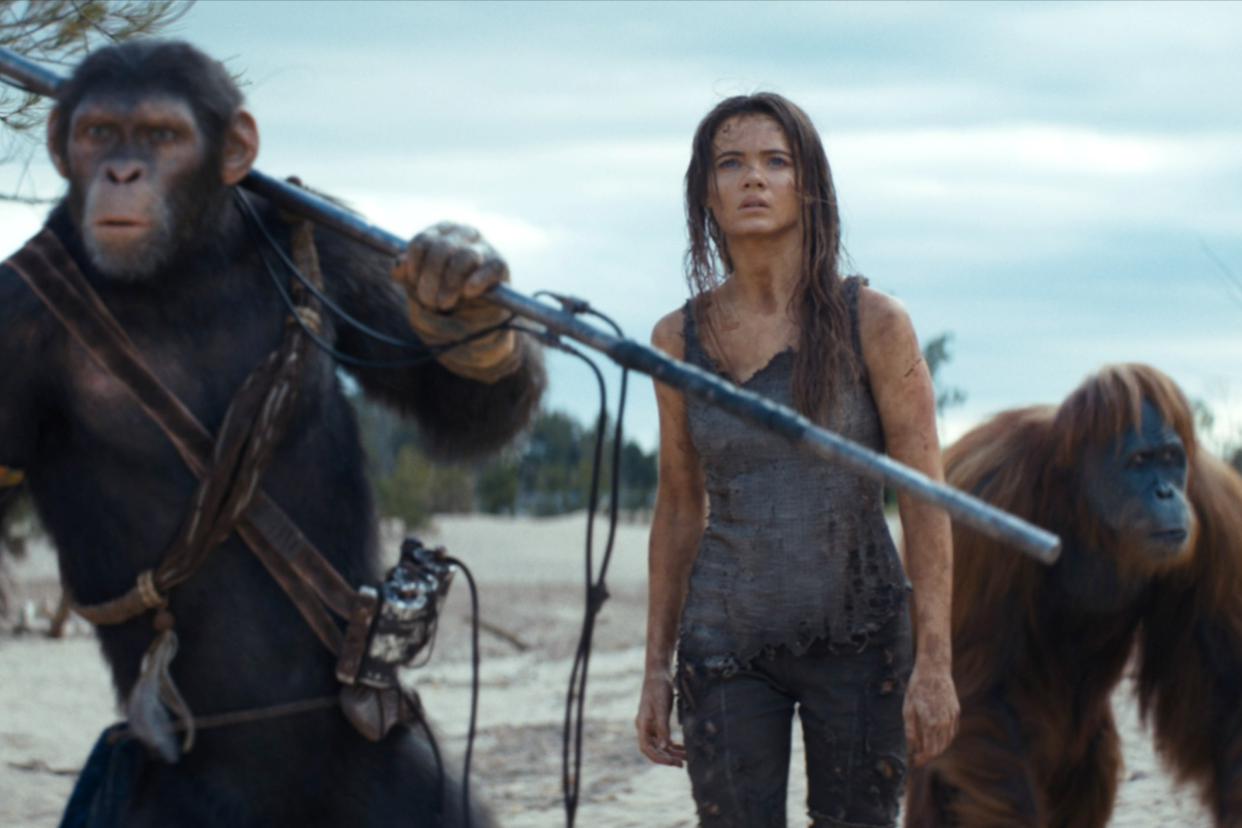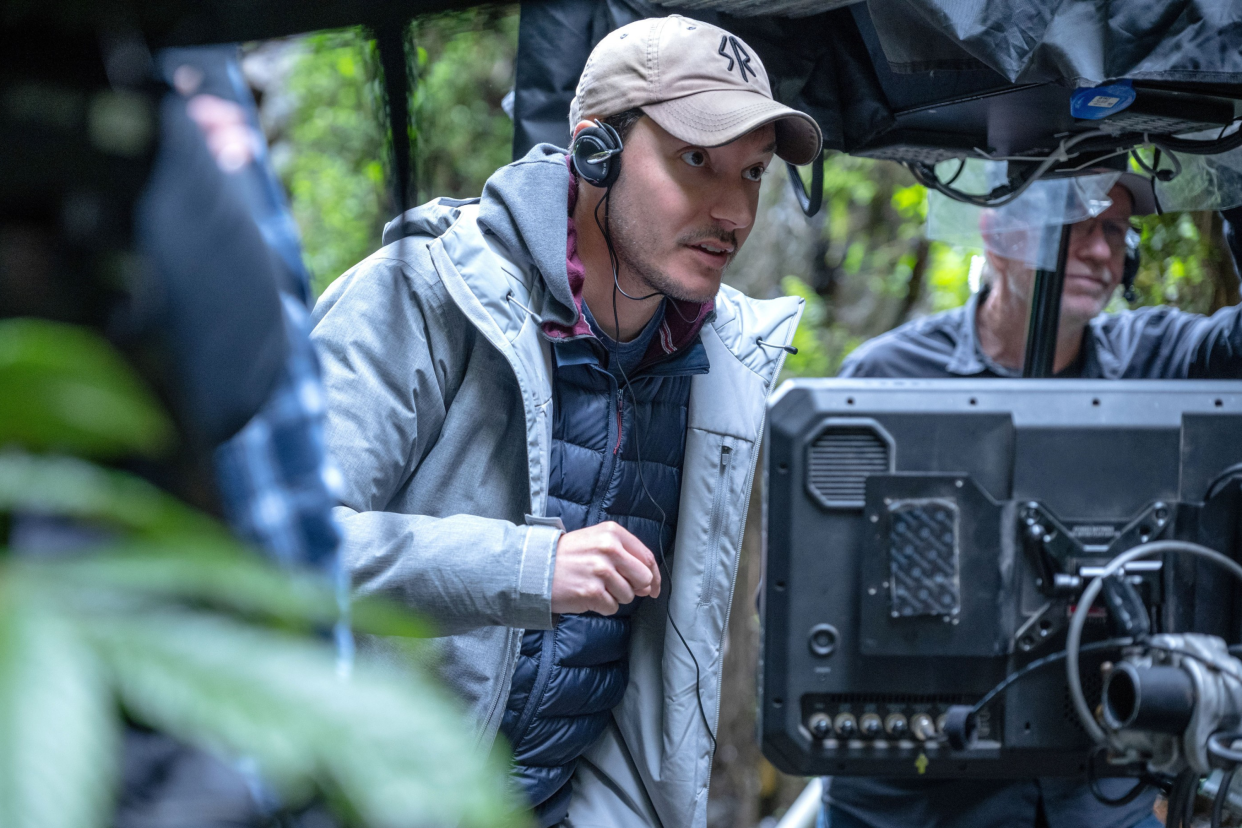'Kingdom of the Planet of the Apes' actors had weeks of 'ape school' to get into character: 'It really requires a lot of transformation'
For Kingdom of the Planet of the Apes director Wes Ball, helming the latest installment of the storied franchise meant respecting the legacy of the films while also making something that could exist on its own.
“We weren't really interested in just doing a direct sequel,” Ball told Yahoo Entertainment, referring to the trilogy from the 2010s, the final being 2017’s War for the Planet of the Apes, directed by Matt Reeves. “I thought we needed to do something that stood on its own, was confident enough and worthy enough to have its own story, its own character, its own kind of journey and adventure.”
The movie, which opens in theaters May 10, comes generations after the death of ape leader Caesar (played by Andy Serkis in the previous three films). Because of human hubris and a virus that spread over the world, humans have regressed and retreated into the shadows while apes have evolved and gained dominance.
This film focuses on a particular young ape, Noa (Owen Teague), who has strong ties to his family and friends. When his community is violently raided by new leader Proximus Caesar (Kevin Durand), a bonobo who’s far less sympathetic to his fellow primates than his namesake, Noa goes on a journey to save lives and bring them back home. On his journey, he experiences many firsts, including human interaction with a resourceful young woman (Freya Allan).
“We set off to make a cool, fun adventure movie, a coming-of-age adventure this time — a younger character, younger story — as he sets off to rediscover a world that he knows nothing about,” Ball said.

Creating the ‘Kingdom’
A large part of that meant creating a believable world where apes are in charge. Ball had definite “must-haves” when it came to visual effects and the plausibility of his actors.
Not only did the director want “thoughtfulness and truth in the drama,” but he was also counting on “this amazing spectacle on the visuals.”
For the hyperrealistic effects, Ball harnessed the talent of Peter Jackson’s Wētā FX team for motion-capture technology. In addition to the onscreen tech, Ball also called on movement coordinator Alain Gauthier to help the actors move like actual primates.
“I wanted to bring physical theater to the actors so that they learn the ways that are taught to all the actors that work on a stage physically, whether it's creating a character, or a creature or an animal,” Gauthier told Yahoo Entertainment.
The former Cirque du Soleil performer said he coached between 60 and 70 actors, who also attended six weeks of “ape school.”
“The way I work is obviously taking the person, transforming them, and then having them lay the natural character over,” Gauthier said. “They go through this whole process, which is not easy, because it's also an emotional process. It's a physical process. And it really requires a lot of transformation on the part of the actors.”
The stance alone took the actors “a good two weeks of intensive work,” he said.
While Gauthier praised the actors and creative team, he also mentioned an understandable challenge for the cast when it came to consistently embodying their ape characters.
“One of the difficulties that we did encounter, obviously, because of the nature of motion capture, was that an actor, sometimes being challenged by the director or some changes in the script — or whatever happens, because it's a creative process, and we know how that can go — is that they sometimes had to quickly make changes,” Gauthier said. “That would be very tempting to go into their natural habits of, ‘OK, well, I'm gonna say this differently,’ and they forget the ape for a fraction of a second.”

Ball agreed while also noting that “a lot of trust” went into directing his cast and getting strong performances.
“We had to calibrate, and a lot of times it had to do with speaking. ‘Oh, you said that too human-like,’” he said. “We decided early on that we had to do more talking in this movie, we had to start steering ourselves toward that ’68 version where they're just full-on talking.”
Ball is referencing the Planet of the Apes’ first onscreen adventure, when Charlton Heston starred in the 1968 film famous for its twist ending. Adapted from the 1963 novel by Pierre Boulle, the franchise evolved over several decades to also include a TV series and comic books.
While the film franchise got a fresh start from director Tim Burton in 2001, it was the trilogy that launched 10 years later with Rise of the Planet of the Apes that introduced the Caesar character, reignited strong interest — and offered Ball a through line for his current incarnation.
“I have a lot of affection for the original ’68 movie. I grew up watching that thing. Those images are really important to me, and I love the previous trilogy,” Ball said. “It was really important to us to not lose the tether to what came before, to honor that.”
That being said, the director wanted to evolve the way in which the characters speak from the previous trilogy, which saw less dialogue than the original film, which takes place in the year 3978.
“You see the evolution even in the previous trilogy, where Caesar says one little word and by the end of the war, he's kind of saying sentences, so we wanted to be an evolution to that. So that was more the bigger adjustment we kept trying to find is how they speak,” Ball said.
So is this the beginning of another trilogy, or at least the first of more Ball-directed Planet of the Apes films to come?
“If audiences respond to the characters — which I hope they will, I think they will — and they want to see more of the story — we certainly do — we'd love to see where it goes,” Ball said. “We think we've got a lot of story to tell before Charlton Heston crashes down from the skies.”
Kingdom of the Planet of the Apes is in theaters May 10.


